Corporate Law BO1CLAW314 Assignment: Business Structure and Contracts
VerifiedAdded on 2022/08/27
|10
|2344
|18
Report
AI Summary
This assignment addresses key aspects of corporate law, providing legal advice on business structures, contract validity, and the rule of indoor management. The first question examines the most suitable business structure (partnership, company, sole trader, or trust) for entrepreneurs DJ_PP and Khan Chan, given the high-risk nature of their nightclub venture, emphasizing limited liability. Question two assesses the validity of a contract between 'Rainforests-R-Stupid' and RR, considering the role of a receptionist and Section 140 of the Corporations Act 2001. The third question evaluates the binding nature of a loan contract and the organization's accountability, applying the rule of indoor management from the case of Royal British Bank v Turquand, and its limitations as per Irvine v Union Bank of Australia. The assignment uses case law such as Salomon v A Salomon and Co Ltd, Wang v Rong, and Lion Nathan Australia Pty Ltd v Coopers Brewery Limited to support its arguments, providing a comprehensive analysis of corporate law principles.
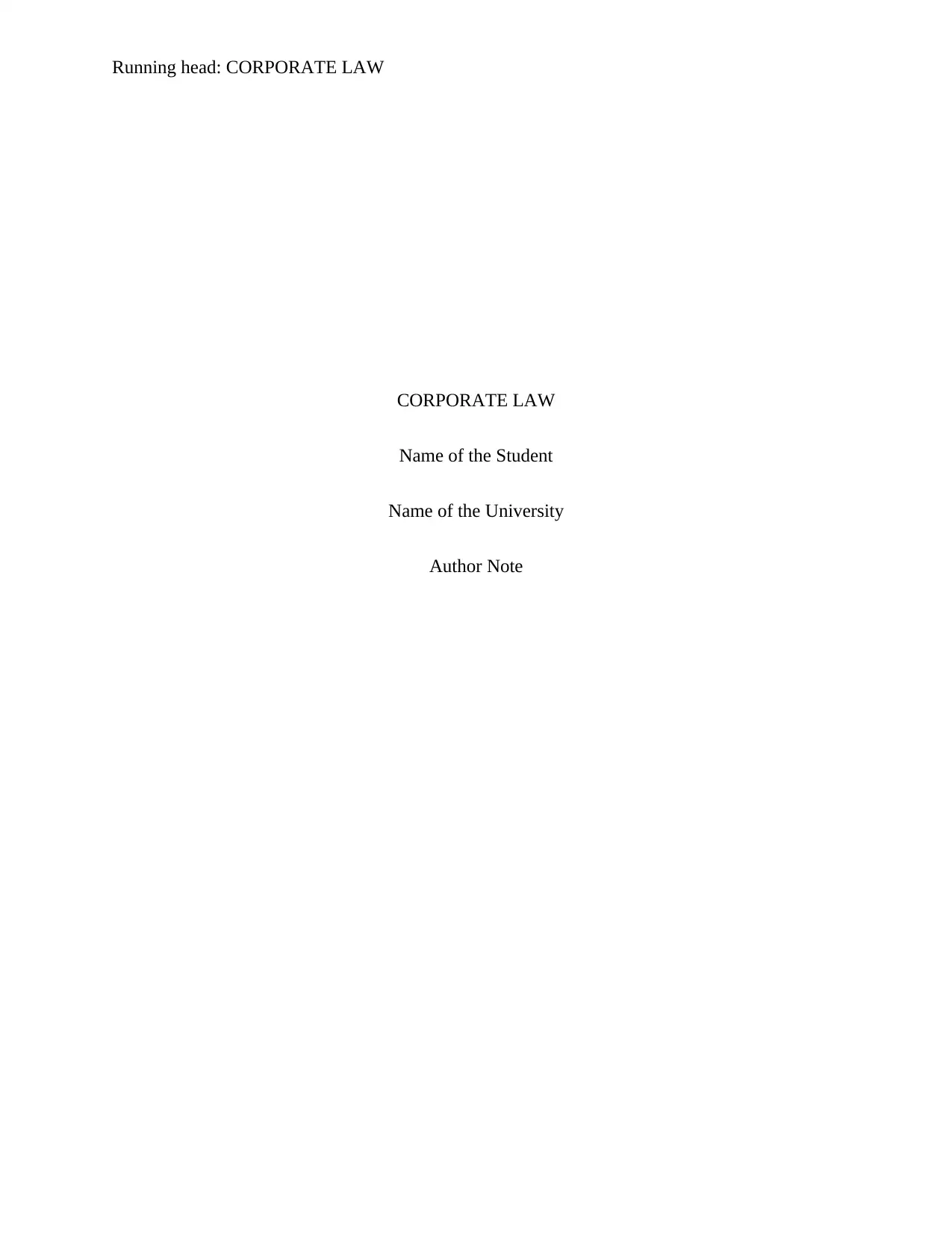
Running head: CORPORATE LAW
CORPORATE LAW
Name of the Student
Name of the University
Author Note
CORPORATE LAW
Name of the Student
Name of the University
Author Note
Paraphrase This Document
Need a fresh take? Get an instant paraphrase of this document with our AI Paraphraser
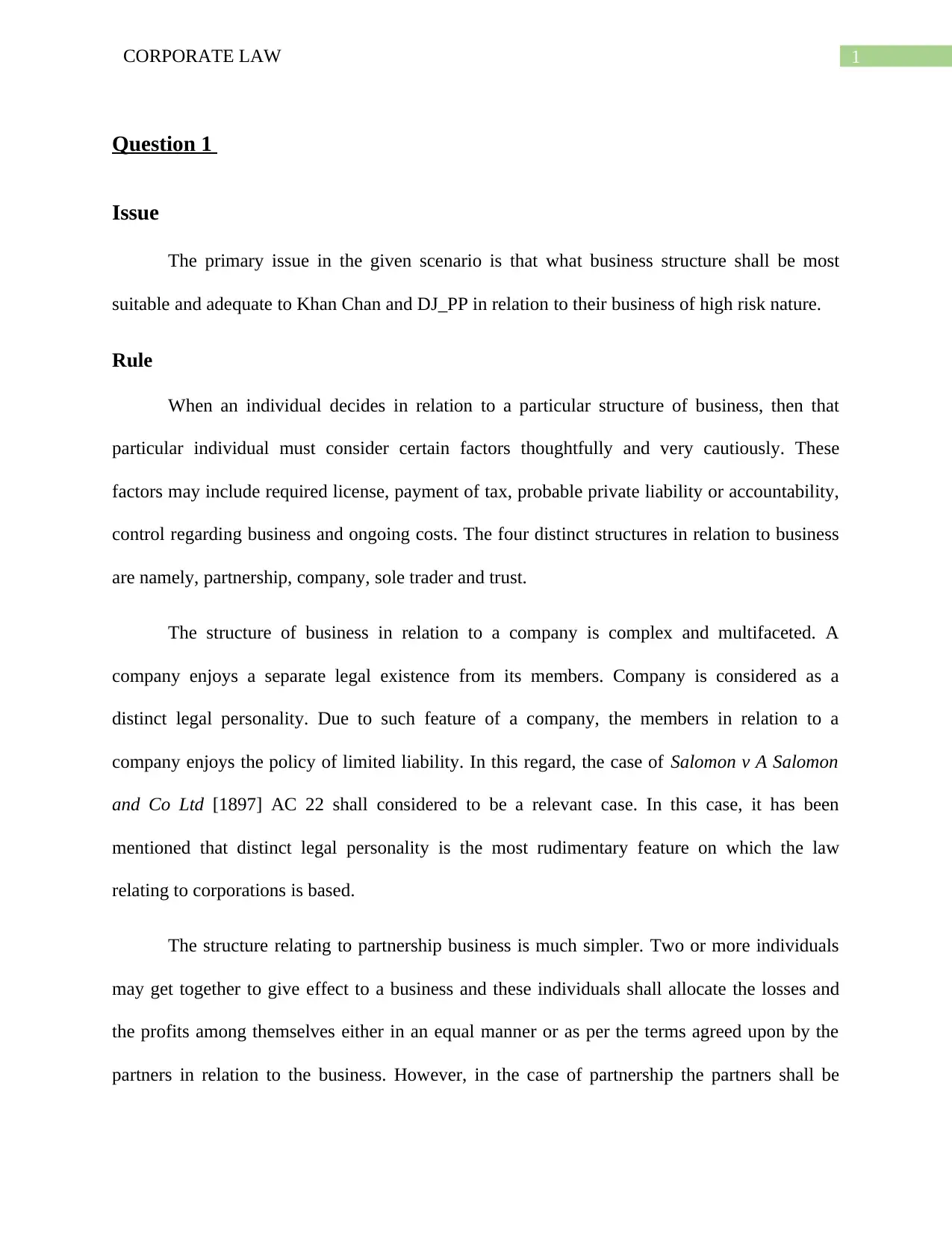
1CORPORATE LAW
Question 1
Issue
The primary issue in the given scenario is that what business structure shall be most
suitable and adequate to Khan Chan and DJ_PP in relation to their business of high risk nature.
Rule
When an individual decides in relation to a particular structure of business, then that
particular individual must consider certain factors thoughtfully and very cautiously. These
factors may include required license, payment of tax, probable private liability or accountability,
control regarding business and ongoing costs. The four distinct structures in relation to business
are namely, partnership, company, sole trader and trust.
The structure of business in relation to a company is complex and multifaceted. A
company enjoys a separate legal existence from its members. Company is considered as a
distinct legal personality. Due to such feature of a company, the members in relation to a
company enjoys the policy of limited liability. In this regard, the case of Salomon v A Salomon
and Co Ltd [1897] AC 22 shall considered to be a relevant case. In this case, it has been
mentioned that distinct legal personality is the most rudimentary feature on which the law
relating to corporations is based.
The structure relating to partnership business is much simpler. Two or more individuals
may get together to give effect to a business and these individuals shall allocate the losses and
the profits among themselves either in an equal manner or as per the terms agreed upon by the
partners in relation to the business. However, in the case of partnership the partners shall be
Question 1
Issue
The primary issue in the given scenario is that what business structure shall be most
suitable and adequate to Khan Chan and DJ_PP in relation to their business of high risk nature.
Rule
When an individual decides in relation to a particular structure of business, then that
particular individual must consider certain factors thoughtfully and very cautiously. These
factors may include required license, payment of tax, probable private liability or accountability,
control regarding business and ongoing costs. The four distinct structures in relation to business
are namely, partnership, company, sole trader and trust.
The structure of business in relation to a company is complex and multifaceted. A
company enjoys a separate legal existence from its members. Company is considered as a
distinct legal personality. Due to such feature of a company, the members in relation to a
company enjoys the policy of limited liability. In this regard, the case of Salomon v A Salomon
and Co Ltd [1897] AC 22 shall considered to be a relevant case. In this case, it has been
mentioned that distinct legal personality is the most rudimentary feature on which the law
relating to corporations is based.
The structure relating to partnership business is much simpler. Two or more individuals
may get together to give effect to a business and these individuals shall allocate the losses and
the profits among themselves either in an equal manner or as per the terms agreed upon by the
partners in relation to the business. However, in the case of partnership the partners shall be
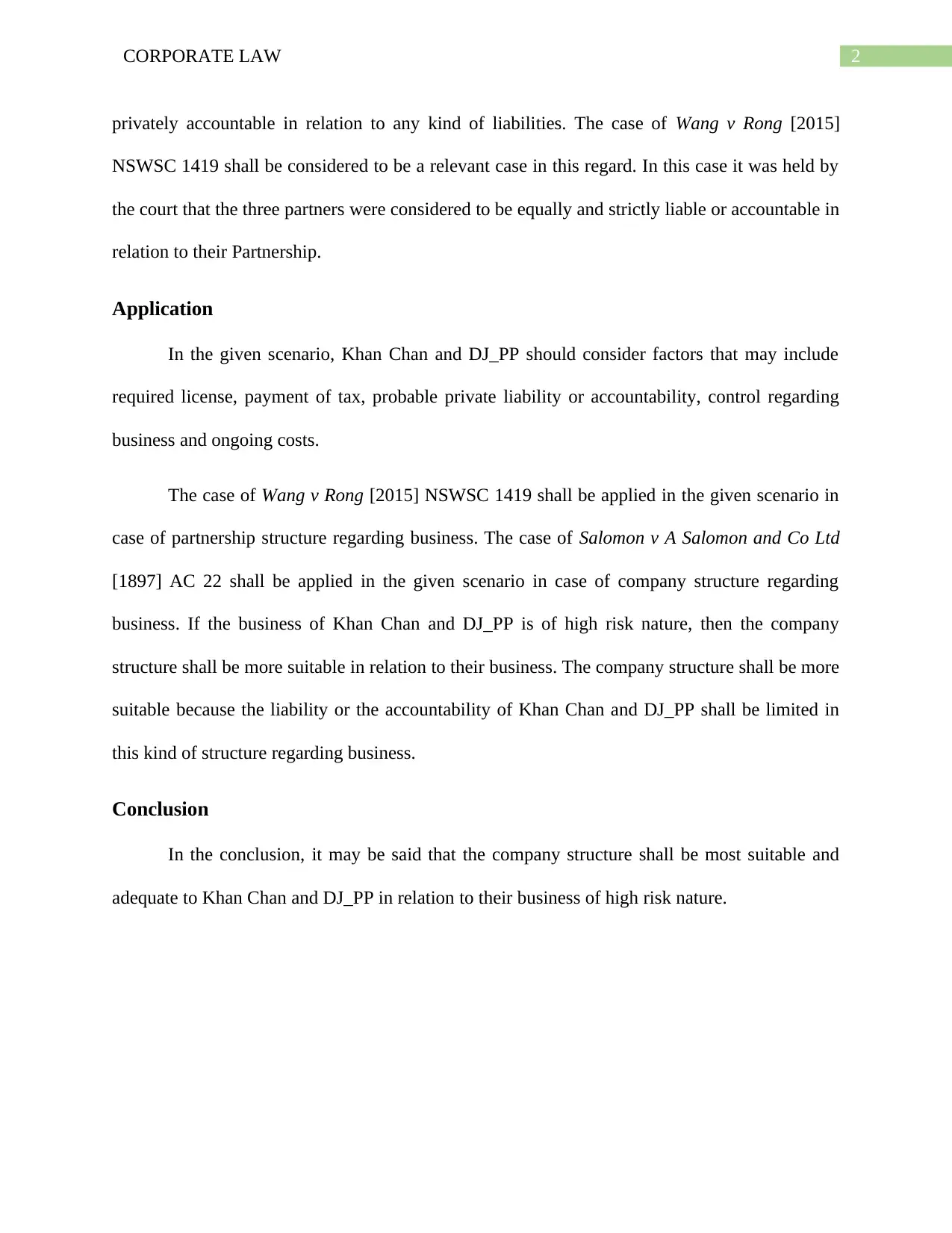
2CORPORATE LAW
privately accountable in relation to any kind of liabilities. The case of Wang v Rong [2015]
NSWSC 1419 shall be considered to be a relevant case in this regard. In this case it was held by
the court that the three partners were considered to be equally and strictly liable or accountable in
relation to their Partnership.
Application
In the given scenario, Khan Chan and DJ_PP should consider factors that may include
required license, payment of tax, probable private liability or accountability, control regarding
business and ongoing costs.
The case of Wang v Rong [2015] NSWSC 1419 shall be applied in the given scenario in
case of partnership structure regarding business. The case of Salomon v A Salomon and Co Ltd
[1897] AC 22 shall be applied in the given scenario in case of company structure regarding
business. If the business of Khan Chan and DJ_PP is of high risk nature, then the company
structure shall be more suitable in relation to their business. The company structure shall be more
suitable because the liability or the accountability of Khan Chan and DJ_PP shall be limited in
this kind of structure regarding business.
Conclusion
In the conclusion, it may be said that the company structure shall be most suitable and
adequate to Khan Chan and DJ_PP in relation to their business of high risk nature.
privately accountable in relation to any kind of liabilities. The case of Wang v Rong [2015]
NSWSC 1419 shall be considered to be a relevant case in this regard. In this case it was held by
the court that the three partners were considered to be equally and strictly liable or accountable in
relation to their Partnership.
Application
In the given scenario, Khan Chan and DJ_PP should consider factors that may include
required license, payment of tax, probable private liability or accountability, control regarding
business and ongoing costs.
The case of Wang v Rong [2015] NSWSC 1419 shall be applied in the given scenario in
case of partnership structure regarding business. The case of Salomon v A Salomon and Co Ltd
[1897] AC 22 shall be applied in the given scenario in case of company structure regarding
business. If the business of Khan Chan and DJ_PP is of high risk nature, then the company
structure shall be more suitable in relation to their business. The company structure shall be more
suitable because the liability or the accountability of Khan Chan and DJ_PP shall be limited in
this kind of structure regarding business.
Conclusion
In the conclusion, it may be said that the company structure shall be most suitable and
adequate to Khan Chan and DJ_PP in relation to their business of high risk nature.
⊘ This is a preview!⊘
Do you want full access?
Subscribe today to unlock all pages.

Trusted by 1+ million students worldwide
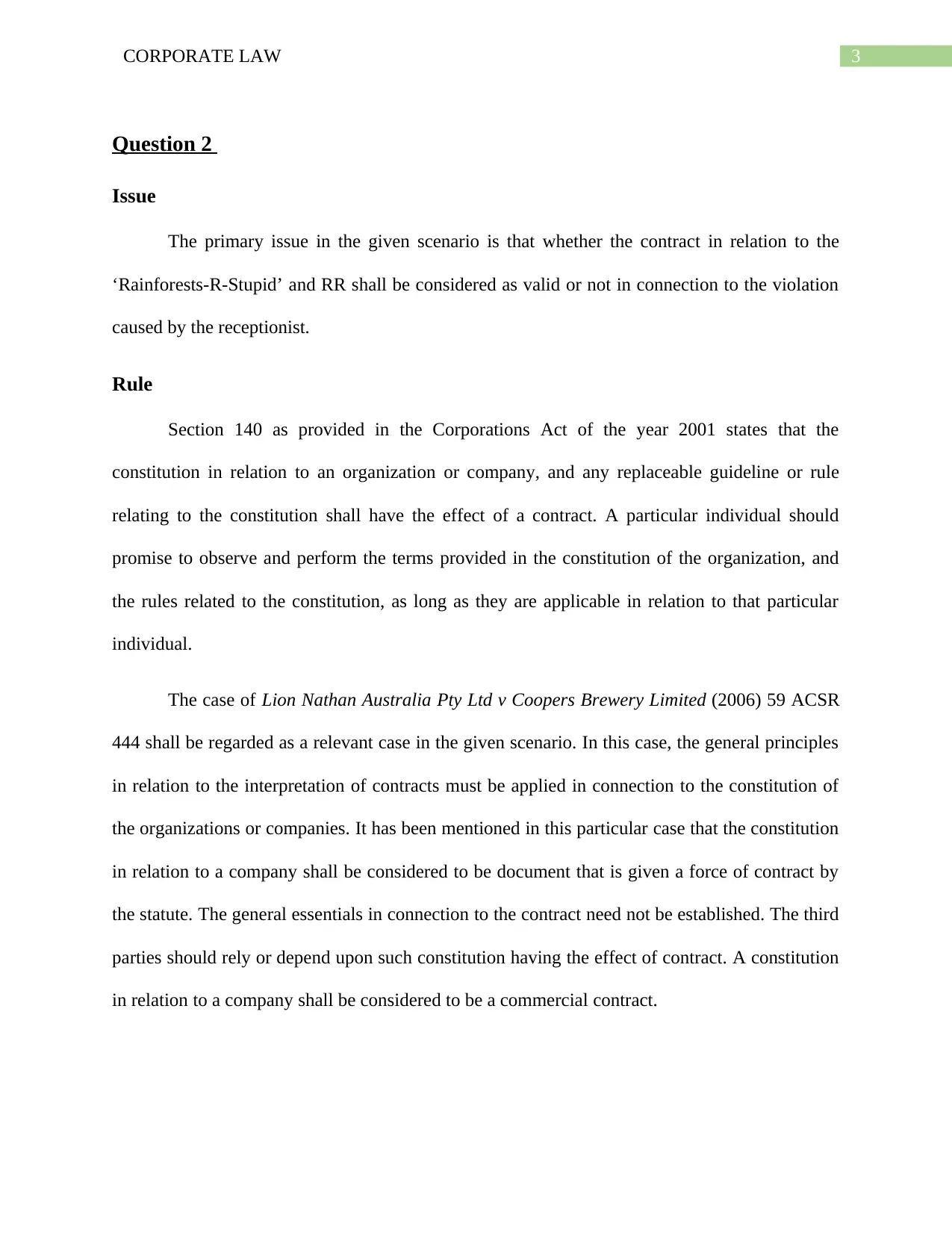
3CORPORATE LAW
Question 2
Issue
The primary issue in the given scenario is that whether the contract in relation to the
‘Rainforests-R-Stupid’ and RR shall be considered as valid or not in connection to the violation
caused by the receptionist.
Rule
Section 140 as provided in the Corporations Act of the year 2001 states that the
constitution in relation to an organization or company, and any replaceable guideline or rule
relating to the constitution shall have the effect of a contract. A particular individual should
promise to observe and perform the terms provided in the constitution of the organization, and
the rules related to the constitution, as long as they are applicable in relation to that particular
individual.
The case of Lion Nathan Australia Pty Ltd v Coopers Brewery Limited (2006) 59 ACSR
444 shall be regarded as a relevant case in the given scenario. In this case, the general principles
in relation to the interpretation of contracts must be applied in connection to the constitution of
the organizations or companies. It has been mentioned in this particular case that the constitution
in relation to a company shall be considered to be document that is given a force of contract by
the statute. The general essentials in connection to the contract need not be established. The third
parties should rely or depend upon such constitution having the effect of contract. A constitution
in relation to a company shall be considered to be a commercial contract.
Question 2
Issue
The primary issue in the given scenario is that whether the contract in relation to the
‘Rainforests-R-Stupid’ and RR shall be considered as valid or not in connection to the violation
caused by the receptionist.
Rule
Section 140 as provided in the Corporations Act of the year 2001 states that the
constitution in relation to an organization or company, and any replaceable guideline or rule
relating to the constitution shall have the effect of a contract. A particular individual should
promise to observe and perform the terms provided in the constitution of the organization, and
the rules related to the constitution, as long as they are applicable in relation to that particular
individual.
The case of Lion Nathan Australia Pty Ltd v Coopers Brewery Limited (2006) 59 ACSR
444 shall be regarded as a relevant case in the given scenario. In this case, the general principles
in relation to the interpretation of contracts must be applied in connection to the constitution of
the organizations or companies. It has been mentioned in this particular case that the constitution
in relation to a company shall be considered to be document that is given a force of contract by
the statute. The general essentials in connection to the contract need not be established. The third
parties should rely or depend upon such constitution having the effect of contract. A constitution
in relation to a company shall be considered to be a commercial contract.
Paraphrase This Document
Need a fresh take? Get an instant paraphrase of this document with our AI Paraphraser
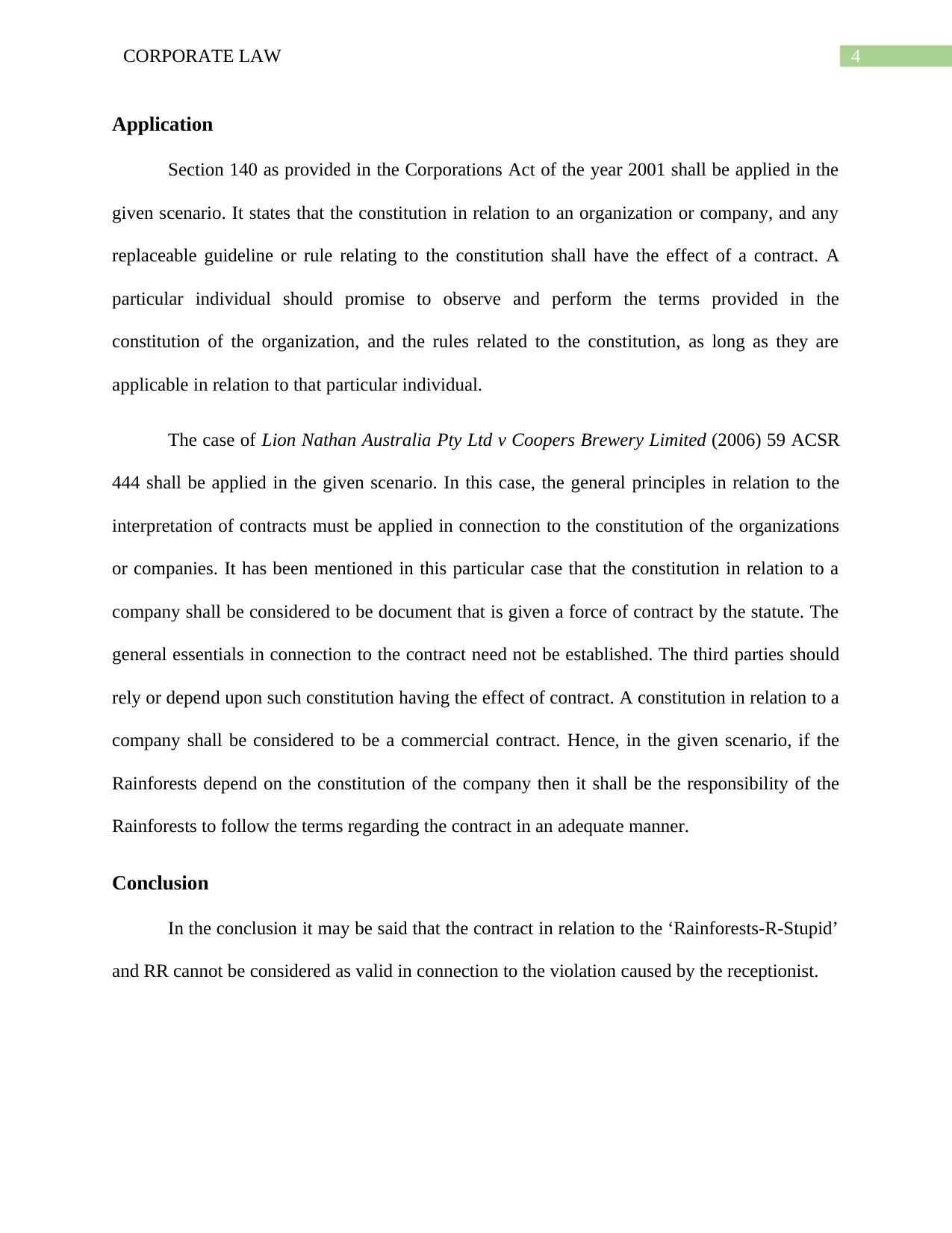
4CORPORATE LAW
Application
Section 140 as provided in the Corporations Act of the year 2001 shall be applied in the
given scenario. It states that the constitution in relation to an organization or company, and any
replaceable guideline or rule relating to the constitution shall have the effect of a contract. A
particular individual should promise to observe and perform the terms provided in the
constitution of the organization, and the rules related to the constitution, as long as they are
applicable in relation to that particular individual.
The case of Lion Nathan Australia Pty Ltd v Coopers Brewery Limited (2006) 59 ACSR
444 shall be applied in the given scenario. In this case, the general principles in relation to the
interpretation of contracts must be applied in connection to the constitution of the organizations
or companies. It has been mentioned in this particular case that the constitution in relation to a
company shall be considered to be document that is given a force of contract by the statute. The
general essentials in connection to the contract need not be established. The third parties should
rely or depend upon such constitution having the effect of contract. A constitution in relation to a
company shall be considered to be a commercial contract. Hence, in the given scenario, if the
Rainforests depend on the constitution of the company then it shall be the responsibility of the
Rainforests to follow the terms regarding the contract in an adequate manner.
Conclusion
In the conclusion it may be said that the contract in relation to the ‘Rainforests-R-Stupid’
and RR cannot be considered as valid in connection to the violation caused by the receptionist.
Application
Section 140 as provided in the Corporations Act of the year 2001 shall be applied in the
given scenario. It states that the constitution in relation to an organization or company, and any
replaceable guideline or rule relating to the constitution shall have the effect of a contract. A
particular individual should promise to observe and perform the terms provided in the
constitution of the organization, and the rules related to the constitution, as long as they are
applicable in relation to that particular individual.
The case of Lion Nathan Australia Pty Ltd v Coopers Brewery Limited (2006) 59 ACSR
444 shall be applied in the given scenario. In this case, the general principles in relation to the
interpretation of contracts must be applied in connection to the constitution of the organizations
or companies. It has been mentioned in this particular case that the constitution in relation to a
company shall be considered to be document that is given a force of contract by the statute. The
general essentials in connection to the contract need not be established. The third parties should
rely or depend upon such constitution having the effect of contract. A constitution in relation to a
company shall be considered to be a commercial contract. Hence, in the given scenario, if the
Rainforests depend on the constitution of the company then it shall be the responsibility of the
Rainforests to follow the terms regarding the contract in an adequate manner.
Conclusion
In the conclusion it may be said that the contract in relation to the ‘Rainforests-R-Stupid’
and RR cannot be considered as valid in connection to the violation caused by the receptionist.
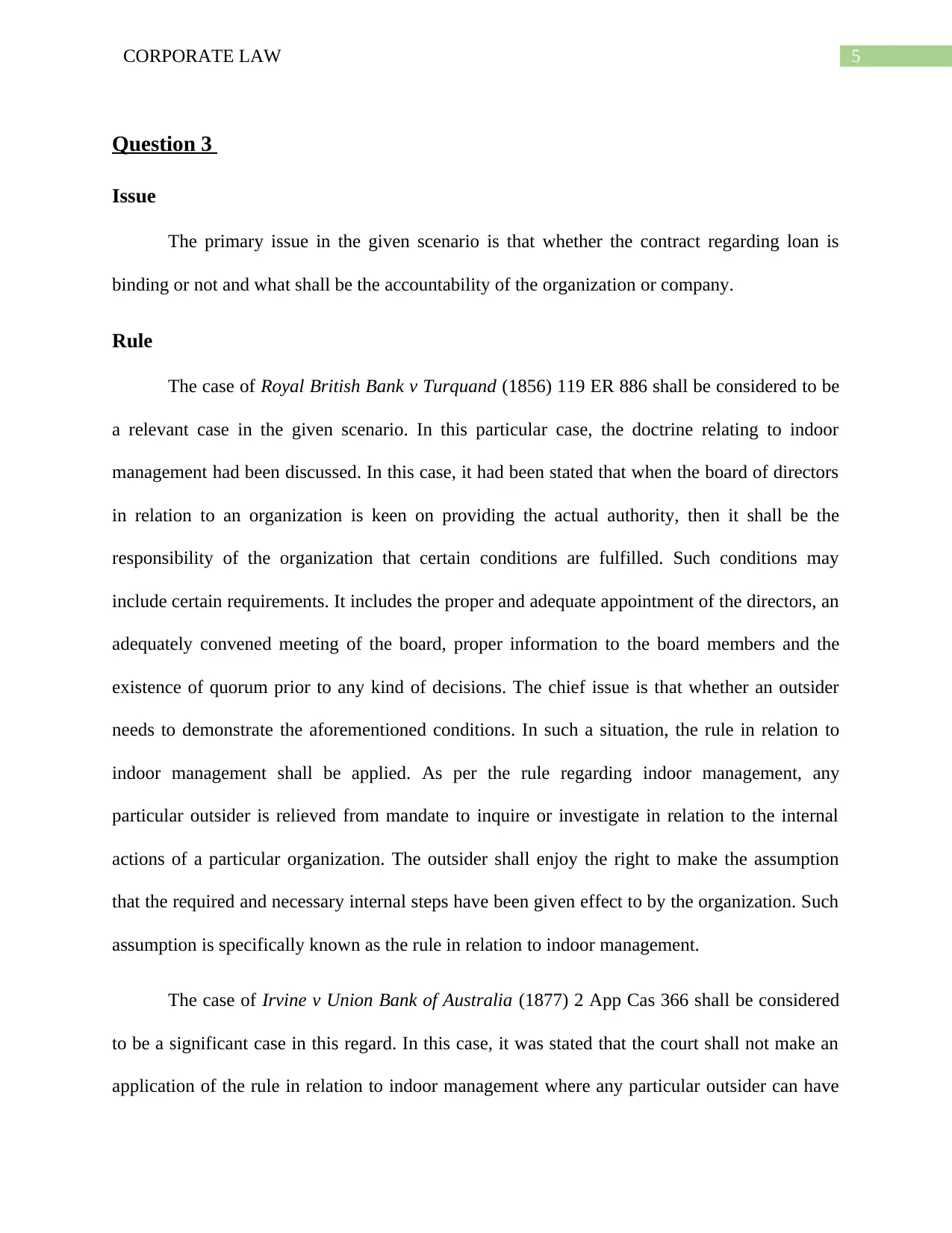
5CORPORATE LAW
Question 3
Issue
The primary issue in the given scenario is that whether the contract regarding loan is
binding or not and what shall be the accountability of the organization or company.
Rule
The case of Royal British Bank v Turquand (1856) 119 ER 886 shall be considered to be
a relevant case in the given scenario. In this particular case, the doctrine relating to indoor
management had been discussed. In this case, it had been stated that when the board of directors
in relation to an organization is keen on providing the actual authority, then it shall be the
responsibility of the organization that certain conditions are fulfilled. Such conditions may
include certain requirements. It includes the proper and adequate appointment of the directors, an
adequately convened meeting of the board, proper information to the board members and the
existence of quorum prior to any kind of decisions. The chief issue is that whether an outsider
needs to demonstrate the aforementioned conditions. In such a situation, the rule in relation to
indoor management shall be applied. As per the rule regarding indoor management, any
particular outsider is relieved from mandate to inquire or investigate in relation to the internal
actions of a particular organization. The outsider shall enjoy the right to make the assumption
that the required and necessary internal steps have been given effect to by the organization. Such
assumption is specifically known as the rule in relation to indoor management.
The case of Irvine v Union Bank of Australia (1877) 2 App Cas 366 shall be considered
to be a significant case in this regard. In this case, it was stated that the court shall not make an
application of the rule in relation to indoor management where any particular outsider can have
Question 3
Issue
The primary issue in the given scenario is that whether the contract regarding loan is
binding or not and what shall be the accountability of the organization or company.
Rule
The case of Royal British Bank v Turquand (1856) 119 ER 886 shall be considered to be
a relevant case in the given scenario. In this particular case, the doctrine relating to indoor
management had been discussed. In this case, it had been stated that when the board of directors
in relation to an organization is keen on providing the actual authority, then it shall be the
responsibility of the organization that certain conditions are fulfilled. Such conditions may
include certain requirements. It includes the proper and adequate appointment of the directors, an
adequately convened meeting of the board, proper information to the board members and the
existence of quorum prior to any kind of decisions. The chief issue is that whether an outsider
needs to demonstrate the aforementioned conditions. In such a situation, the rule in relation to
indoor management shall be applied. As per the rule regarding indoor management, any
particular outsider is relieved from mandate to inquire or investigate in relation to the internal
actions of a particular organization. The outsider shall enjoy the right to make the assumption
that the required and necessary internal steps have been given effect to by the organization. Such
assumption is specifically known as the rule in relation to indoor management.
The case of Irvine v Union Bank of Australia (1877) 2 App Cas 366 shall be considered
to be a significant case in this regard. In this case, it was stated that the court shall not make an
application of the rule in relation to indoor management where any particular outsider can have
⊘ This is a preview!⊘
Do you want full access?
Subscribe today to unlock all pages.

Trusted by 1+ million students worldwide
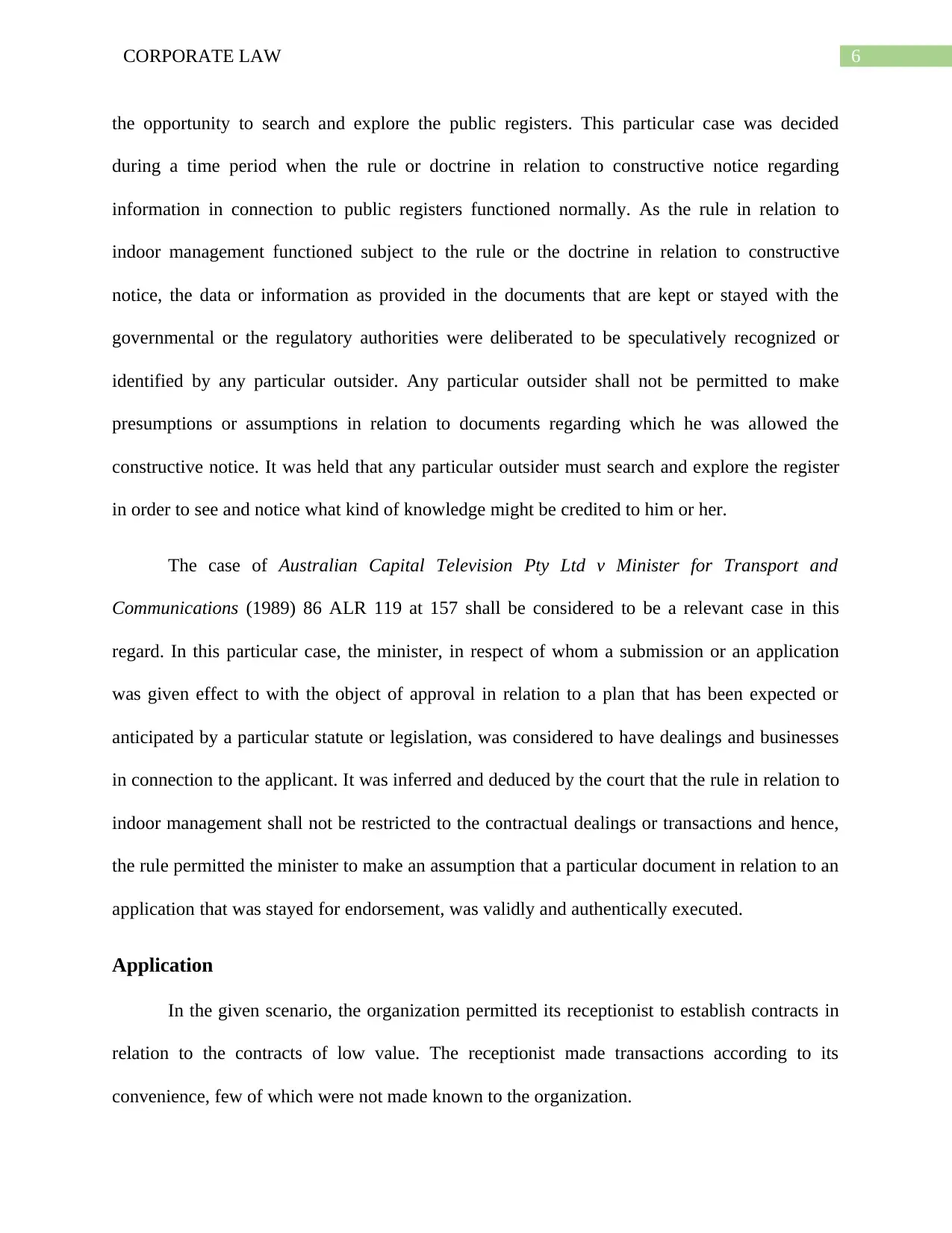
6CORPORATE LAW
the opportunity to search and explore the public registers. This particular case was decided
during a time period when the rule or doctrine in relation to constructive notice regarding
information in connection to public registers functioned normally. As the rule in relation to
indoor management functioned subject to the rule or the doctrine in relation to constructive
notice, the data or information as provided in the documents that are kept or stayed with the
governmental or the regulatory authorities were deliberated to be speculatively recognized or
identified by any particular outsider. Any particular outsider shall not be permitted to make
presumptions or assumptions in relation to documents regarding which he was allowed the
constructive notice. It was held that any particular outsider must search and explore the register
in order to see and notice what kind of knowledge might be credited to him or her.
The case of Australian Capital Television Pty Ltd v Minister for Transport and
Communications (1989) 86 ALR 119 at 157 shall be considered to be a relevant case in this
regard. In this particular case, the minister, in respect of whom a submission or an application
was given effect to with the object of approval in relation to a plan that has been expected or
anticipated by a particular statute or legislation, was considered to have dealings and businesses
in connection to the applicant. It was inferred and deduced by the court that the rule in relation to
indoor management shall not be restricted to the contractual dealings or transactions and hence,
the rule permitted the minister to make an assumption that a particular document in relation to an
application that was stayed for endorsement, was validly and authentically executed.
Application
In the given scenario, the organization permitted its receptionist to establish contracts in
relation to the contracts of low value. The receptionist made transactions according to its
convenience, few of which were not made known to the organization.
the opportunity to search and explore the public registers. This particular case was decided
during a time period when the rule or doctrine in relation to constructive notice regarding
information in connection to public registers functioned normally. As the rule in relation to
indoor management functioned subject to the rule or the doctrine in relation to constructive
notice, the data or information as provided in the documents that are kept or stayed with the
governmental or the regulatory authorities were deliberated to be speculatively recognized or
identified by any particular outsider. Any particular outsider shall not be permitted to make
presumptions or assumptions in relation to documents regarding which he was allowed the
constructive notice. It was held that any particular outsider must search and explore the register
in order to see and notice what kind of knowledge might be credited to him or her.
The case of Australian Capital Television Pty Ltd v Minister for Transport and
Communications (1989) 86 ALR 119 at 157 shall be considered to be a relevant case in this
regard. In this particular case, the minister, in respect of whom a submission or an application
was given effect to with the object of approval in relation to a plan that has been expected or
anticipated by a particular statute or legislation, was considered to have dealings and businesses
in connection to the applicant. It was inferred and deduced by the court that the rule in relation to
indoor management shall not be restricted to the contractual dealings or transactions and hence,
the rule permitted the minister to make an assumption that a particular document in relation to an
application that was stayed for endorsement, was validly and authentically executed.
Application
In the given scenario, the organization permitted its receptionist to establish contracts in
relation to the contracts of low value. The receptionist made transactions according to its
convenience, few of which were not made known to the organization.
Paraphrase This Document
Need a fresh take? Get an instant paraphrase of this document with our AI Paraphraser
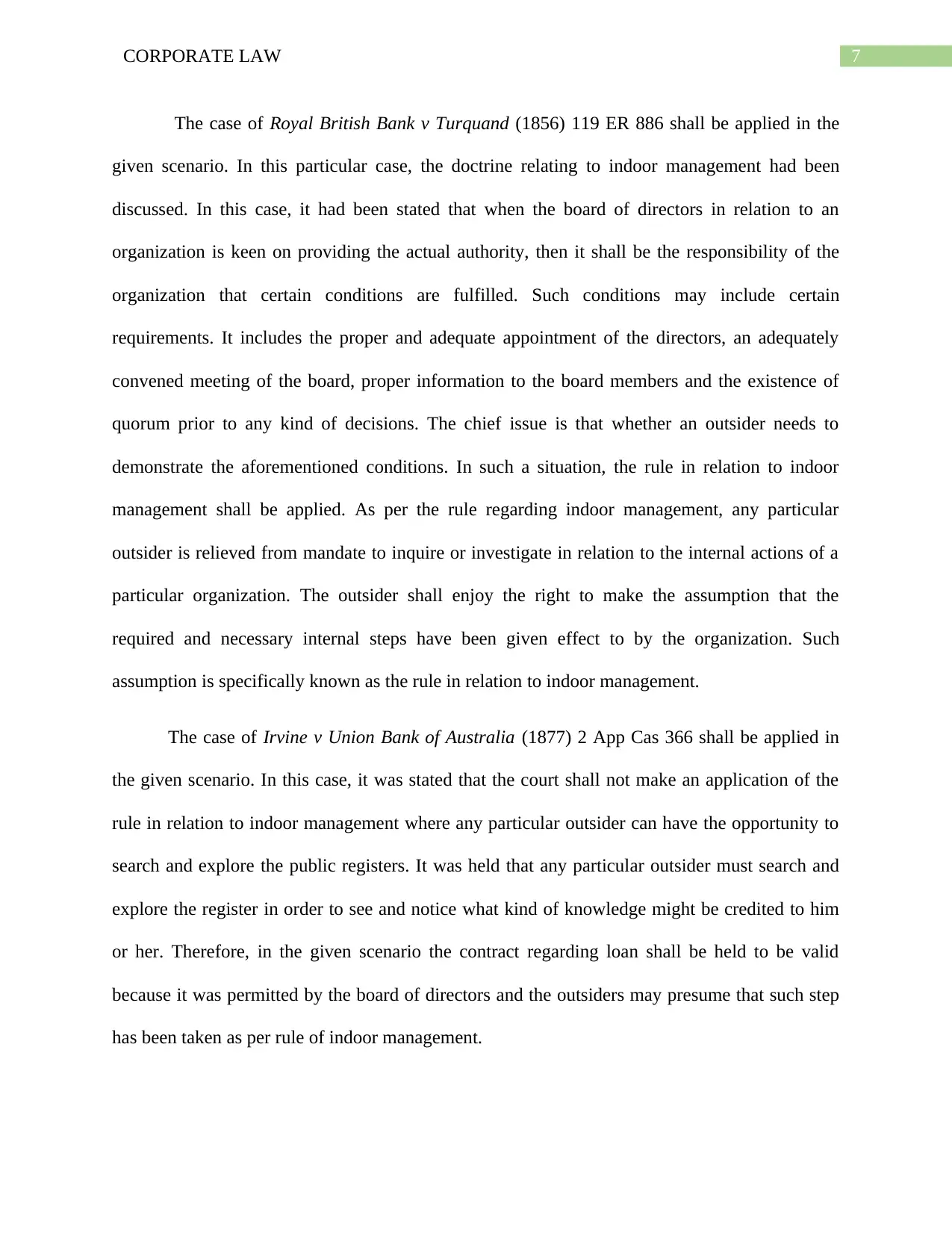
7CORPORATE LAW
The case of Royal British Bank v Turquand (1856) 119 ER 886 shall be applied in the
given scenario. In this particular case, the doctrine relating to indoor management had been
discussed. In this case, it had been stated that when the board of directors in relation to an
organization is keen on providing the actual authority, then it shall be the responsibility of the
organization that certain conditions are fulfilled. Such conditions may include certain
requirements. It includes the proper and adequate appointment of the directors, an adequately
convened meeting of the board, proper information to the board members and the existence of
quorum prior to any kind of decisions. The chief issue is that whether an outsider needs to
demonstrate the aforementioned conditions. In such a situation, the rule in relation to indoor
management shall be applied. As per the rule regarding indoor management, any particular
outsider is relieved from mandate to inquire or investigate in relation to the internal actions of a
particular organization. The outsider shall enjoy the right to make the assumption that the
required and necessary internal steps have been given effect to by the organization. Such
assumption is specifically known as the rule in relation to indoor management.
The case of Irvine v Union Bank of Australia (1877) 2 App Cas 366 shall be applied in
the given scenario. In this case, it was stated that the court shall not make an application of the
rule in relation to indoor management where any particular outsider can have the opportunity to
search and explore the public registers. It was held that any particular outsider must search and
explore the register in order to see and notice what kind of knowledge might be credited to him
or her. Therefore, in the given scenario the contract regarding loan shall be held to be valid
because it was permitted by the board of directors and the outsiders may presume that such step
has been taken as per rule of indoor management.
The case of Royal British Bank v Turquand (1856) 119 ER 886 shall be applied in the
given scenario. In this particular case, the doctrine relating to indoor management had been
discussed. In this case, it had been stated that when the board of directors in relation to an
organization is keen on providing the actual authority, then it shall be the responsibility of the
organization that certain conditions are fulfilled. Such conditions may include certain
requirements. It includes the proper and adequate appointment of the directors, an adequately
convened meeting of the board, proper information to the board members and the existence of
quorum prior to any kind of decisions. The chief issue is that whether an outsider needs to
demonstrate the aforementioned conditions. In such a situation, the rule in relation to indoor
management shall be applied. As per the rule regarding indoor management, any particular
outsider is relieved from mandate to inquire or investigate in relation to the internal actions of a
particular organization. The outsider shall enjoy the right to make the assumption that the
required and necessary internal steps have been given effect to by the organization. Such
assumption is specifically known as the rule in relation to indoor management.
The case of Irvine v Union Bank of Australia (1877) 2 App Cas 366 shall be applied in
the given scenario. In this case, it was stated that the court shall not make an application of the
rule in relation to indoor management where any particular outsider can have the opportunity to
search and explore the public registers. It was held that any particular outsider must search and
explore the register in order to see and notice what kind of knowledge might be credited to him
or her. Therefore, in the given scenario the contract regarding loan shall be held to be valid
because it was permitted by the board of directors and the outsiders may presume that such step
has been taken as per rule of indoor management.
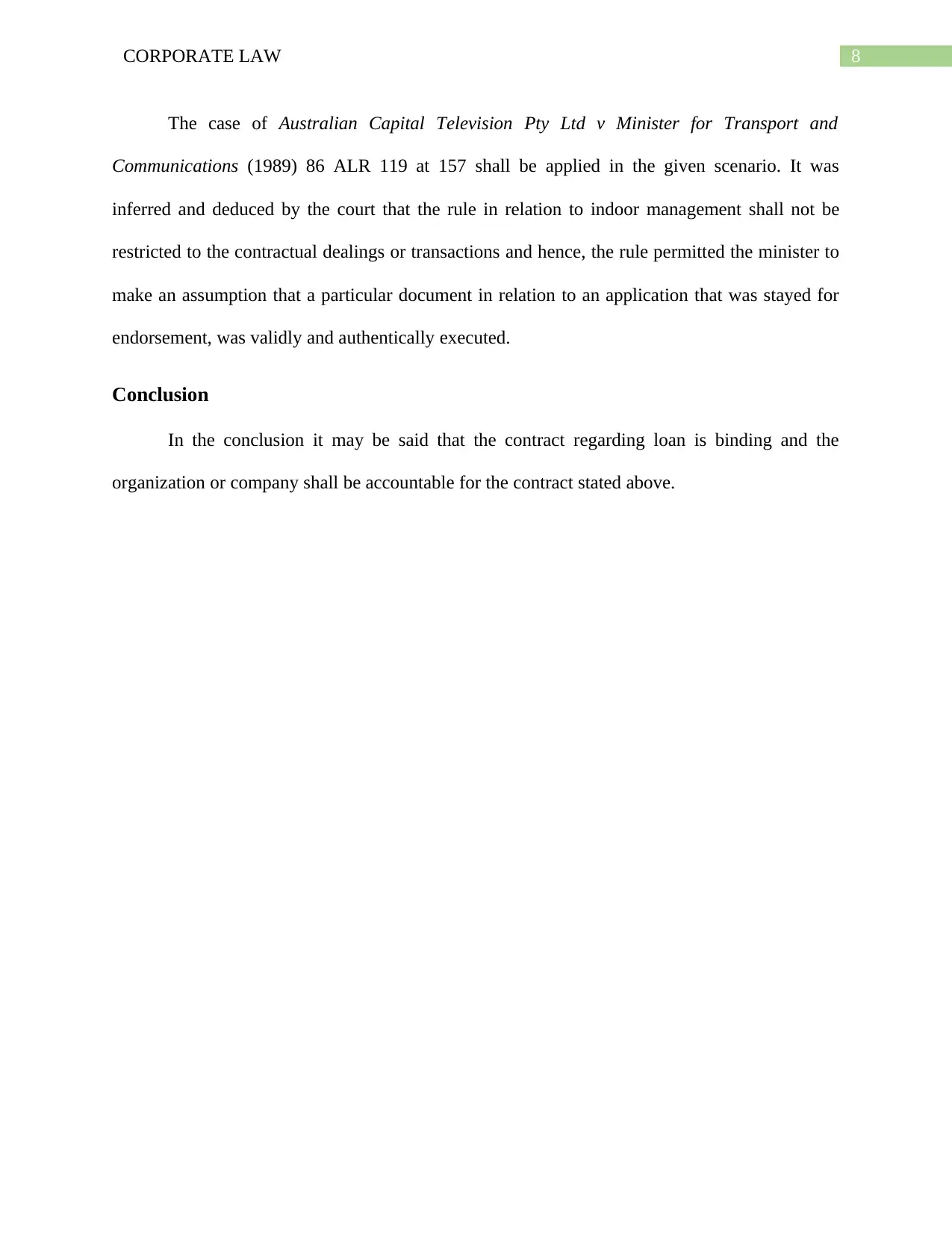
8CORPORATE LAW
The case of Australian Capital Television Pty Ltd v Minister for Transport and
Communications (1989) 86 ALR 119 at 157 shall be applied in the given scenario. It was
inferred and deduced by the court that the rule in relation to indoor management shall not be
restricted to the contractual dealings or transactions and hence, the rule permitted the minister to
make an assumption that a particular document in relation to an application that was stayed for
endorsement, was validly and authentically executed.
Conclusion
In the conclusion it may be said that the contract regarding loan is binding and the
organization or company shall be accountable for the contract stated above.
The case of Australian Capital Television Pty Ltd v Minister for Transport and
Communications (1989) 86 ALR 119 at 157 shall be applied in the given scenario. It was
inferred and deduced by the court that the rule in relation to indoor management shall not be
restricted to the contractual dealings or transactions and hence, the rule permitted the minister to
make an assumption that a particular document in relation to an application that was stayed for
endorsement, was validly and authentically executed.
Conclusion
In the conclusion it may be said that the contract regarding loan is binding and the
organization or company shall be accountable for the contract stated above.
⊘ This is a preview!⊘
Do you want full access?
Subscribe today to unlock all pages.

Trusted by 1+ million students worldwide
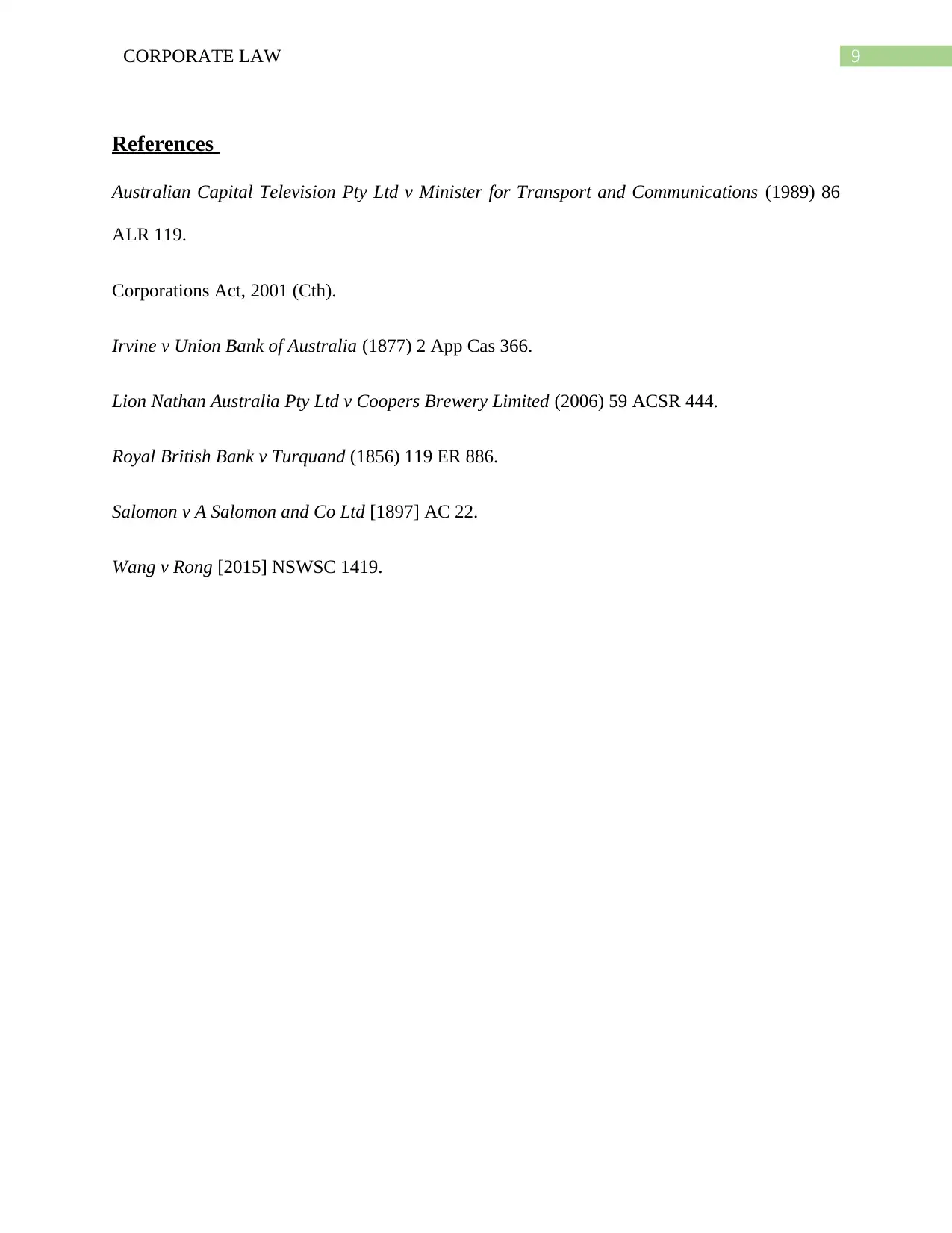
9CORPORATE LAW
References
Australian Capital Television Pty Ltd v Minister for Transport and Communications (1989) 86
ALR 119.
Corporations Act, 2001 (Cth).
Irvine v Union Bank of Australia (1877) 2 App Cas 366.
Lion Nathan Australia Pty Ltd v Coopers Brewery Limited (2006) 59 ACSR 444.
Royal British Bank v Turquand (1856) 119 ER 886.
Salomon v A Salomon and Co Ltd [1897] AC 22.
Wang v Rong [2015] NSWSC 1419.
References
Australian Capital Television Pty Ltd v Minister for Transport and Communications (1989) 86
ALR 119.
Corporations Act, 2001 (Cth).
Irvine v Union Bank of Australia (1877) 2 App Cas 366.
Lion Nathan Australia Pty Ltd v Coopers Brewery Limited (2006) 59 ACSR 444.
Royal British Bank v Turquand (1856) 119 ER 886.
Salomon v A Salomon and Co Ltd [1897] AC 22.
Wang v Rong [2015] NSWSC 1419.
1 out of 10
Related Documents
Your All-in-One AI-Powered Toolkit for Academic Success.
+13062052269
info@desklib.com
Available 24*7 on WhatsApp / Email
![[object Object]](/_next/static/media/star-bottom.7253800d.svg)
Unlock your academic potential
Copyright © 2020–2026 A2Z Services. All Rights Reserved. Developed and managed by ZUCOL.





